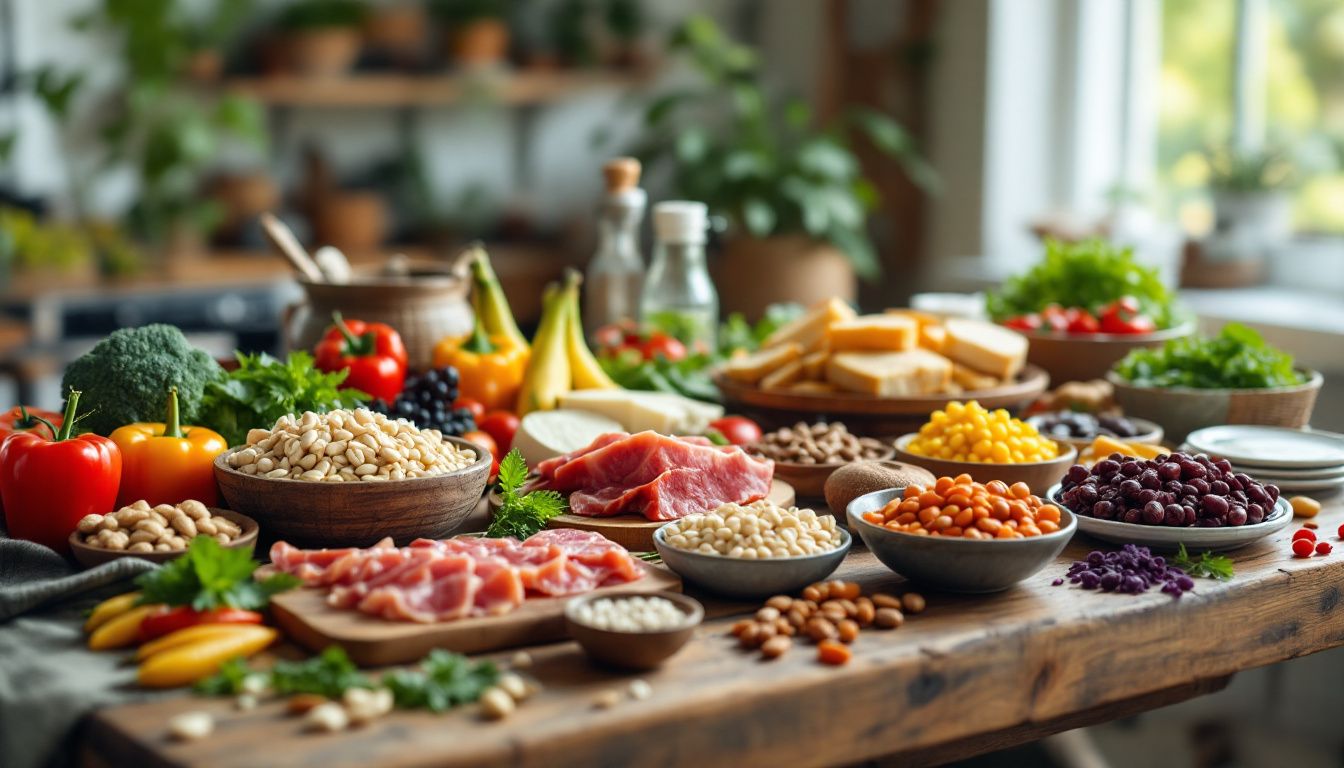Eating healthier can feel tricky, especially when trying to protect your heart. Protein plays a key role in keeping your heart strong and reducing the risk of heart disease. Choosing the right sources can lower cholesterol levels and promote overall health.
Thank you for reading this post, don't forget to subscribe!Keep reading to learn which proteins help your heart most!
Key Takeaways
- Plant-based proteins like lentils, chickpeas, and nuts lower cholesterol and support heart health. Pumpkin seeds provide 8.6 grams of protein per ounce along with key nutrients.
- Fatty fish like salmon and mackerel are rich in omega-3s that reduce heart attack risks. Experts suggest eating fish twice weekly for best benefits.
- Lean poultry such as skinless chicken or turkey offers low-fat protein options, while eggs should be limited to seven per week for those managing cholesterol.
- Red meat increases the chance of heart disease due to saturated fats; limit intake to under 350 grams weekly and replace it with beans or lean meats when possible.
- Processed meats, including bacon and hot dogs, harm heart health by raising cholesterol levels; opt for plant-based proteins instead for better long-term well-being.
Best Plant-Based Protein Sources

Plant-based proteins come packed with nutrients that support heart health and overall well-being. They are rich in fiber, vitamins, and healthy fats—making them a smart choice for any meal.
Legumes and beans
Legumes like lentils, black beans, kidney beans, chickpeas, and split peas are excellent protein sources. Cooked lentils provide 18 grams of protein per cup with less than 1 gram of fat.
Their soluble fiber helps lower cholesterol levels and supports heart health. Legumes also have a low glycemic index, making them ideal for blood sugar control.
These plant-based proteins are rich in essential nutrients like dietary fiber and micronutrients. For example, garbanzo beans (chickpeas) can be added to salads or sandwiches for a healthy boost.
Pinto beans pair well with whole-grain bread to create a balanced meal full of unsaturated fats and energy-packed carbs.
Nuts and seeds
Nuts and seeds provide significant benefits for heart health. Eating a daily serving of nuts may reduce your risk of heart disease by 30% compared to red meat. A handful of almonds, walnuts, or cashews can supply protein while helping to lower bad cholesterol levels.
Sunflower seeds, for instance, offer six grams of protein per ounce and promote cardiovascular health with healthy fats.
Chia seeds and flaxseeds are high in omega-3 fatty acids that support the heart. Pumpkin seeds are an affordable and nutritious option rich in protein and minerals like magnesium. Consider adding nut butters or sprinkling sesame seeds on salads for simple ways to meet your protein needs without concerns about weight gain!
Highlight: Pumpkin seeds as a nutritious protein source
Pumpkin seeds are an excellent source of protein. A single ounce provides 8.6 grams of dietary protein, making them a great plant-based choice for heart health. Along with protein, they are rich in important nutrients like magnesium, zinc, iron, and phosphorus.
These minerals support your cardiovascular system and overall well-being.
They can also help manage cholesterol levels by reducing inflammation in the body. Their ability to regulate blood sugar offers additional benefits for long-term health. Toss pumpkin seeds on salads or mix them into whole-grain bread recipes for added crunch and nutrition!
Best Animal-Based Protein Sources
Animal-based proteins give your body key nutrients and help keep muscles strong. Choosing leaner options can also support heart health while meeting your protein needs.
Fish and seafood
Fatty fish like salmon, tuna, and mackerel are rich in omega-3 fatty acids. These fats can lower cholesterol levels and reduce the risk of heart attack and stroke. A 6-ounce serving of salmon provides 34 grams of protein with only 4 grams of saturated fat.
Wild-caught options tend to have higher omega-3 content than farm-raised ones.
Experts recommend eating fish 1-2 times a week, with portions around 3–6 ounces. Sardines are another great choice—affordable and high in nutrients. Canned fish like tuna can also be convenient for quick meals while supporting heart health.
Always keep your servings moderate for balanced nutrition.
Omega-3s from fish play a key role in boosting cardiovascular health.
Poultry and eggs
Poultry like chicken and turkey offers lean meats that are low in saturated fat. These are packed with niacin, magnesium, vitamin A, and zinc. Choosing skinless parts or white meat ensures lower fat content while still providing essential nutrients for heart health.
A 3-ounce serving—about the size of a deck of cards—is ideal to meet daily protein needs.
Eggs serve as a complete protein source, containing vitamins A, E, B12, selenium, choline, and iron. For those managing high LDL cholesterol or type 2 diabetes, limiting egg intake to seven per week is recommended.
Pair eggs with whole-grain bread or vegetables for added fiber and balance your meal effectively!
Proteins to Limit or Avoid
Some proteins can raise cholesterol levels and harm heart health. Choosing wisely can help lower risks like cardiovascular disease or coronary heart issues.
Red meat
Red meat, like beef and lamb, contains iron, zinc, and vitamin B12. These nutrients support energy levels and overall health. But eating too much can harm your heart. High consumption raises the risk of cardiovascular disease and stroke due to saturated fat content.
The Heart Foundation suggests limiting red meat intake to under 350 grams weekly—that’s about one to three meals per week. Replacing it with lean meats, beans, nuts, or fish may lower risks of coronary heart disease.
Healthy swaps benefit cholesterol levels while supporting a balanced diet.
Processed meats
Processed meats, like bacon, hot dogs, and sausages, pose risks to heart health. They are packed with high levels of salt and saturated fats. These ingredients increase cholesterol levels, which can harm your cardiovascular health.
Frequent consumption may lead to chronic conditions like elevated cholesterol or even a cardiac arrest.
The International Agency for Research on Cancer (IARC) classifies processed meat as a Group 1 carcinogen. This means it’s linked to colorectal cancer risk. To protect your heart health, limit these foods in your diet.
Opt for leaner meats or plant-based proteins instead—healthier options make a big difference!
Tips for Including Heart-Healthy Proteins in Your Diet
Start small by swapping unhealthy choices with heart-friendly proteins like lentils or fish. Try pairing meals with whole grains for added nutrients and balance.
Meal preparation ideas
Meal prep saves time and helps with healthy eating. Planning ahead makes it easier to include heart-healthy proteins.
- Cook a batch of black beans, kidney beans, or pinto beans for the week. Use them in salads, soups, or as a side dish.
- Grill turkey breast or chicken and store portions for quick meals. Pair with whole grains like quinoa or brown rice.
- Boil eggs and keep them in the fridge for a protein-packed snack or breakfast.
- Make black bean burgers in advance and freeze them. They heat up fast and go great with whole-grain bread.
- Roast chickpeas for snacks instead of chips, adding spices like dill or coriander.
- Buy low-fat dairy products like Greek yogurt for easy snacks or smoothies.
- Prepare nut butters such as peanut butter to use on whole-grain bread or fruits.
- Pre-cut vegetables while other foods cook to save time later in the week.
- Portion out servings of unsalted nuts and seeds like pumpkin seeds for quick grab-and-go options.
- Try incorporating soy milk or soy products into recipes, such as stir-fries or breakfast bowls.
- Store meals in labeled containers using dates to rotate older items first, preventing waste.
- Bake fish like salmon rich in omega-3 fatty acids and add it to wraps or salads during the week.
- Replace processed red meat with lean meats like turkey for recipes you enjoy often.
- Assemble mason jar salads using leafy greens, garbanzo beans, split peas, and a small dressing portion on top for fresh lunches each day!
Healthy protein swaps
Switching to heart-friendly proteins can improve cholesterol levels and reduce cardiovascular disease risk. These swaps are simple and work well for most meals.
- Replace red meat with fish like salmon or trout. They are rich in omega-3 fatty acids, which benefit heart health.
- Swap processed meats like sausages with grilled chicken or turkey. Lean meats have less saturated fat, keeping your lipid profile in check.
- Use Greek yogurt instead of sour cream in recipes. It offers high protein content with less fat.
- Instead of peanut butter loaded with additives, switch to natural nut butters. Almond or cashew butter works great and contains unsaturated fats.
- Choose black beans or kidney beans over ground beef in tacos or chili dishes. Beans add plant-based protein and dietary fiber.
- Opt for split peas or garbanzo beans in soups rather than fatty sausages or bacon pieces. Pulses help control elevated cholesterol levels.
- Substitute whole chicken or dark poultry cuts with skinless chicken breasts. This lowers saturated fats while maintaining lean protein intake.
- Replace full-fat cheese with low-fat dairy options like fat-free dairy slices or part-skim mozzarella.
- Use soy milk instead of heavy cream in coffee or smoothies for a creamy texture without high saturated fats.
- Try whole-grain bread filled with pinto beans instead of regular white bread sandwiches loaded with processed meat fillings.
Next up: Tips for Including Heart-Healthy Proteins in Your Diet!
Conclusion
Eating the right proteins can keep your heart healthy. Focus on plant-based sources, fish, and lean meats. Limit red meat and avoid processed meats to reduce risks. Small changes in your meals can make a big difference for your heart.
Stick to balanced choices for lasting health benefits!
References
- https://www.healthline.com/nutrition/healthiest-beans-legumes
- https://www.eatingwell.com/nuts-and-seeds-ranked-by-protein-8423784
- https://www.healthline.com/nutrition/11-benefits-of-pumpkin-seeds (2018-09-24)
- https://www.today.com/health/diet-fitness/pumpkin-seed-protein-benefits-rcna147426 (2024-04-12)
- https://www.heart.org/en/healthy-living/healthy-eating/eat-smart/nutrition-basics/picking-healthy-proteins (2024-08-28)
- https://health.osu.edu/wellness/exercise-and-nutrition/healthiest-animal-protein-sources
- https://pmc.ncbi.nlm.nih.gov/articles/PMC11306033/
- https://pmc.ncbi.nlm.nih.gov/articles/PMC6971786/
- https://www.health.harvard.edu/nutrition/high-protein-foods-the-best-protein-sources-to-include-in-a-healthy-diet
- https://nutritionsource.hsph.harvard.edu/meal-prep/
- https://www.healthline.com/health/heart-disease/heart-healthy-proteins
